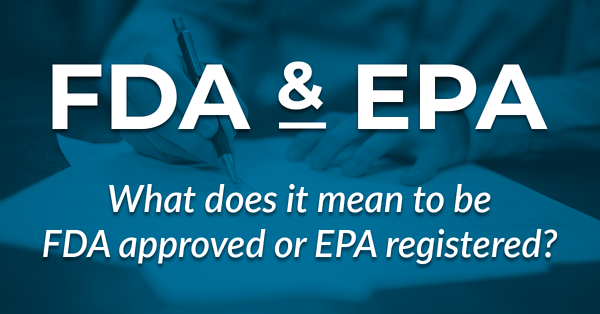FDA Approved! EPA Registered! What Does This Really Mean?

You've most likely come across these product declarations many times over these last several months and certainly throughout the pandemic as guidelines beckoned for increased hand hygiene and surface disinfection. Sure, throwing around FDA’ s (U.S. Food and Drug Administration) or EPA's (U.S. Environmental Protection Agency) make products seem safe and effective but what is each agency responsible for, and what do their regulations and approvals mean?
Some marketers claim products are "FDA approved," but how do you know what the FDA approves? Does "EPA registered" mean the product is effective? Are these agencies conceptually the same? Let us shed more light on this.
The FDA Doesn't Approve Companies
Remember all those e-mails claiming that their products were made by FDA approved facilities? Well, the FDA does not "approve" healthcare facilities, laboratories, or manufacturers. However, the FDA does have the full authority to inspect regulated facilities to verify they comply with all applicable and strict good manufacturing practice regulations. Owners and operators of domestic or foreign food, drug, and most device facilities must register their facilities with the FDA.
What Does the FDA Approve?
The FDA approves new drugs and certain biologics but these must be proven safe and effective to the FDA's satisfaction before companies can market them. These manufacturers must also be able to prove they can make the drug product according to federal quality standards.
The FDA does not develop or test products before a product is approved but rather, the FDA experts review the results of laboratory, animal, and human clinical testing done by manufacturers. If the FDA grants approval, it means the agency has determined that the product's benefits outweigh the known risks for the intended use. But beware-not all FDA regulated products are approved before they go to market.
When approval is not required, the FDA still has regulatory authority over these products if there is a safety concern. For OTC (over-the-counter) drugs there are monographs for different categories that work like a recipe book of what is acceptable. These monographs make it possible for companies to make safe and effective products without FDA pre-approval.
FDA Regulation of Over the Counter Drugs
A nonprescription, or over-the-counter (OTC) medicine, is one that the FDA has found to be safe and effective for direct consumer use based on the label instructions and warnings. They require a wider margin of safety for OTC medicines than for prescription drugs. FDA requires companies that manufacture drugs to register their manufacturing facilities and list their drug products with the FDA.
Many first aid products are considered OTC products and some of personal care products are considered cosmetics. These products are subject to FDA regulation of the facilities and products. For example, hand sanitizer, first aid creams, ointments, sprays, and gels are regulated by the FDA.
The EPA
The EPA registers products that kill microorganisms on surfaces such as a pesticide. Before chemical manufacturers can sell pesticides within the United States, the EPA must evaluate them thoroughly to ensure that they meet federal safety standards to protect human health and the environment. The EPA will grant a "registration" or license that permits a pesticide's distribution, sale, and use only after the company meets the scientific and regulatory requirements.
Surface disinfectants are considered pesticides. Disinfectants kill bacteria, viruses, and fungi. According to the EPA, these are considered pests just as insects, weeds, snails, grubs, and slugs are considered pests. Therefore, the EPA classifies disinfectants and sanitizers as pesticides.
Summary
The EPA registers products that kill microorganisms on surfaces as pesticides. The FDA regulates products used on humans, such as hand sanitizers and antibacterial soaps. An easy way to remember this is the Environmental Protection Agency regulates products used on the environment around you, such as your workspace, the store, hospital, or home. The Food and Drug administration mostly regulates products that go in or on your body, the way food and drugs are typically used.
Staying in compliance is easier than ever. MDS sells a variety of properly labeled surface disinfectants that are EPA registered in all 50 states. Many brands are registered on the EPA List N. Products on List N have been tested against SARS-CoV-2 (COVID-19) or meet the requirements for the Emerging Viral Pathogen Claim. Now all you need to do is tap the link and ...
+shop for EPA Registered Disinfectants here
Orders. Questions. Volume Discounts. Special Requests.
Click or Call Today
Monday - Friday 8:30am - 4:30pm EST
+800.274.4637 | +716.668.4001 | Fax +716.668.4496 | [email protected] | MDSassociates.com
"We want you to return home safely every day"



